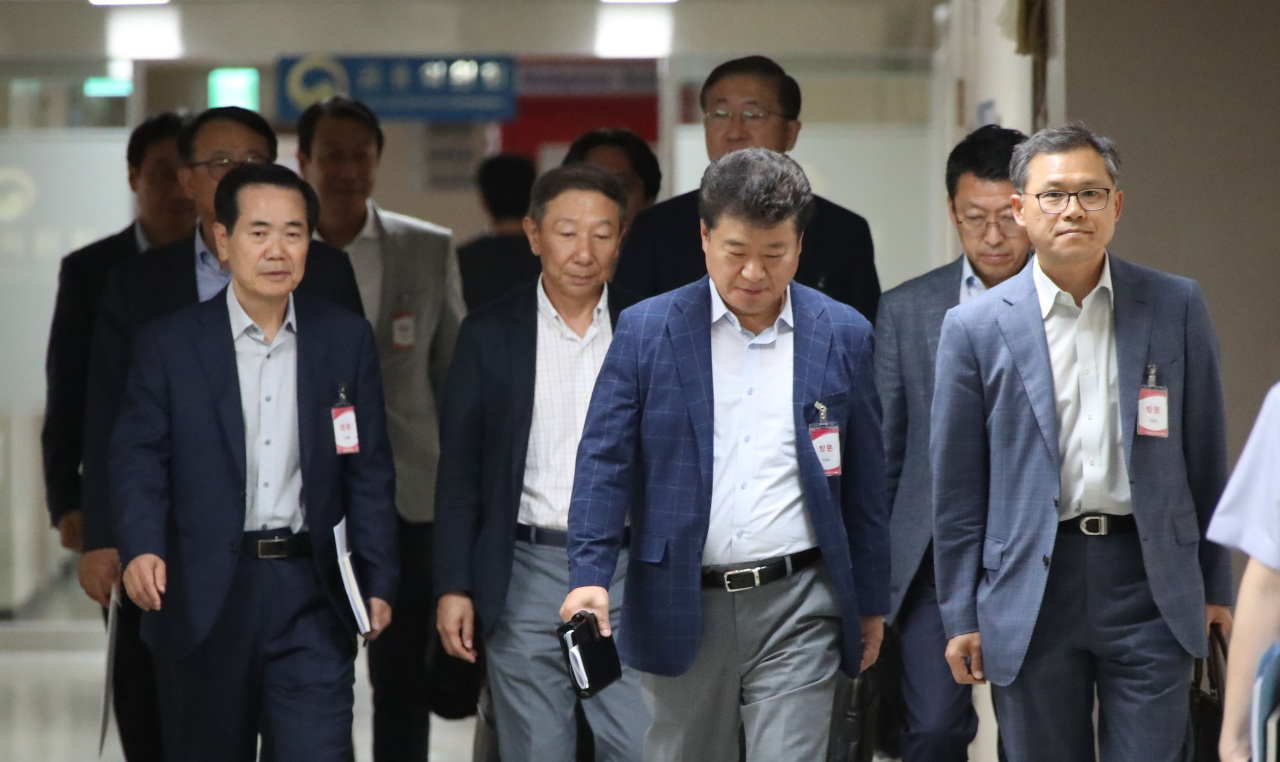Korea speeds up steps to take Japan’s ‘chip move’ to WTO
Government releases W1tr plan to nurture local production of key materials
By Cho Chung-unPublished : July 3, 2019 - 16:44
The South Korean government said Wednesday that it has started to conduct a legal review on its complaint to the World Trade Organization over Japan’s export restrictions -- widely seen as the neighboring country’s retaliation against the ruling by Korea’s top court on wartime forced labor.
Trade officials here believe that Japan’s move to limit exports of key materials used to produce semiconductor and displays violates the WTO’s ban on states’ control of exports. Officials who have successfully worked on a recent trade dispute with Japan on Seoul’s fish import ban will handle the case, they added.
In April, the WTO appellate body overturned its previous decision on Seoul’s measures restricting imports of seafood following the 2011 Fukushima nuclear disaster, saying the restrictions did not fall into the category of arbitrary discrimination.
Trade Minister Yoo Myung-hee also canceled her official trip to Mexico and Peru, indicating that the government is taking the issue seriously, according to reports.
Trade officials here believe that Japan’s move to limit exports of key materials used to produce semiconductor and displays violates the WTO’s ban on states’ control of exports. Officials who have successfully worked on a recent trade dispute with Japan on Seoul’s fish import ban will handle the case, they added.
In April, the WTO appellate body overturned its previous decision on Seoul’s measures restricting imports of seafood following the 2011 Fukushima nuclear disaster, saying the restrictions did not fall into the category of arbitrary discrimination.
Trade Minister Yoo Myung-hee also canceled her official trip to Mexico and Peru, indicating that the government is taking the issue seriously, according to reports.

Top officials at Cheong Wa Dae, South Korea’s presidential office, as well as politicians of the ruling party are closely looking into the matter, amid concerns that such moves could jeopardize the operations of chipmakers and other IT companies already struggling with falling profits over market saturation and the ongoing trade dispute between US and China.
Kim Sang-jo, chief of staff to President Moon Jae-in for policy, said on the same day that he is communicating with top executives at the nation’s five largest conglomerates “to overcome difficulties together.”
Speaking at a three-way consultation session involving Cheong Wa Dae, the government and the ruling Democratic Party, Kim also mentioned his reported meeting with Kim Ki-nam, vice chairman of Samsung Electronics, in charge of the tech giant’s chip business, saying that he is in talks with companies “in pursuit of national interest” and that he would keep communicating with them to better deal with the matter.
The announcement by the Japanese government on Monday has sparked fears in the chip and display industries.
The tightened rules will limit exports of materials and chemicals, including fluorinated polyimide used to make flexible organic light-emitting diode displays. Resist and etching gas, needed for chip fabrication, are also on the list.
Regarding concerns over South Korean chipmakers’ heavy reliance on such selected Japanese materials, the ruling party said it is pushing for a bill to inject 1 trillion won ($862 million) every year to nurture the local semiconductor materials and parts industry.
Amid criticism that Seoul was blindsided by Tokyo, Cho Jung-sik, chief of the policy committee of the Democratic Party, said the government has been seeking ways to nurture the related industry, including the 1 trillion won plan, for months.
Chipmakers have been urging the government to counter such moves by Japan, as such restrictions could seriously hamper operations.
Japan’s move is a credit negative for Korean technology firms, including Samsung Electronics and SK hynix, ratings agency Moody’s said. Samsung and SK hynix account for more than 70 percent of global memory chip output.
According to the Korea International Trade Association, Korea imported 92 percent of its photoresist, 44 percent of its etching gas and 94 percent of its fluorinated polyimide from Japan in the first five months of 2019.
Seoul and Tokyo have been quarreling over the Supreme Court’s ruling to compensate South Koreans who were forced to work in factories during World War II under Japan’s colonial rule of the peninsula. The Japanese government has denied that the move has anything to do with the court’s decision.
By Cho Chung-un (christory@heraldcorp.com)







![[KH Explains] How should Korea adjust its trade defenses against Chinese EVs?](http://res.heraldm.com/phpwas/restmb_idxmake.php?idx=644&simg=/content/image/2024/04/15/20240415050562_0.jpg&u=20240415144419)












![[Today’s K-pop] Stray Kids to return soon: report](http://res.heraldm.com/phpwas/restmb_idxmake.php?idx=642&simg=/content/image/2024/04/16/20240416050713_0.jpg&u=)